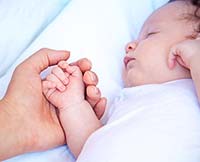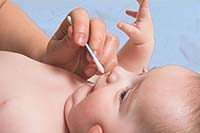 Caring for a baby with MRSA or Staph can be a scary and gut-wrenching experience. The good news is you can reduce the risk of your baby catching an infection by understanding and controlling that risk.
Caring for a baby with MRSA or Staph can be a scary and gut-wrenching experience. The good news is you can reduce the risk of your baby catching an infection by understanding and controlling that risk.
MRSA in newborns – how do they get it?
Babies begin to be populated with bacteria during the birthing process, from mother’s milk, from the environment, and some data suggests from inside the womb as well. Many of these bacteria are “good” and beneficial, helping to ward off infecting bacteria from the babies skin and intestines. As I’ve mentioned before, research shows about 80% of your immune system comes from beneficial flora (including gut and skin bacteria) and the same holds true for newborns too.
But some of these bacteria can cause infections in babies, especially pre-term infants or if the mother’s immune system has been weakened. It’s possible for newborns to get MRSA or Staph bacteria from the mom through the vaginal canal during birth. Infants can also be exposed to these bacteria through contact with hospital staff, catheters and other medical devices, or from contact with contaminated hospital surfaces (Pediatric 2002, 110:285-291).
It’s very important to know that having these bacteria on your babies skin doesn’t mean they are infected. However, if the Staph or MRSA gets through their skin via diaper rash, cuts or a scrape, an infection can develop. Good and consistent hygiene and cleaning and infection control by hospital staff will reduce these risks (here’s more about preventing hospital infections). Getting your own infection under control if you have a history of MRSA and Staph is also important.
Are babies exposed to bacteria before birth?
Evidence is suggesting bacteria can also be passed to a baby before they are even born. Some bacteria and viruses have been found within the amniotic fluid of the mother (the fluid surrounding the fetus). This fluid was previously thought to always be sterile. This suggests that bacteria can be passed from mother to her unborn child and may be a possible cause for pre-term deliveries (PLoS ONE 2008;3:e3056).
There’s also evidence that bacteria (as “L-form” mutated bacteria) can be passed from father to child through his sperm (Arch Androl 1995;35:43-7). This could be part of the reason for “genetic” type predispositions for certain diseases, as science is now discovering a correlation between certain diseases and chronic infections. Keeping your own immune system strong, getting good nutrition and reducing stress during pregnancy can reduce the risks.
Once a baby has a skin infection, the bacteria may spread internally as well. The problem with MRSA in newborns and babies is that their immune system is not well developed yet, making it harder for them to ward off and battle infections and more difficult to treat them.
Treating babies with MRSA
 Treating MRSA in children, especially infants, requires extra care. While some natural remedies can be used with newborns and babies, the dose must be reduced or diluted properly. Generally, the milder remedies for skin infections, including sterilized Manuka honey (not raw) and diluted medicinal tea tree oil can be a good place to start.
Treating MRSA in children, especially infants, requires extra care. While some natural remedies can be used with newborns and babies, the dose must be reduced or diluted properly. Generally, the milder remedies for skin infections, including sterilized Manuka honey (not raw) and diluted medicinal tea tree oil can be a good place to start.
Antibiotics can help if effective against the strain of Staph or MRSA causing the infection. However, antibiotics can put a big strain a baby’s undeveloped immune system, including affecting the “good” bacteria in the gut, which is being linked to allergies and possible future chronic health conditions.
Keeping your baby healthy
It’s important to remember that we depend on many kinds of “good” bacteria to stay healthy. Anything that changes our natural good flora can compromise our health, for both the mother and the baby. It’s been well established that antibiotic therapies change the good flora of the mother to a less-healthy flora. Since the newborn is largely dependent upon the mother for their bacteria, antibiotic use in the mother may be putting the newborn at a disadvantage.
Research also shows treating newborns with antibiotics can disrupt how they develop their gut flora (Acta Paediatrica Volume 92,s441:48–55). Some researchers suggest it may be difficult to normalize newborn gut flora after exposure to antibiotics. Because of the link between antibiotic use and chronic health issues, I advocate using natural alternatives that work with the body, instead of against it whenever possible. Holistic and Integrative physicians are well versed in these supportive therapies.
We all should carefully guard and protect the bacteria that live within us… after all, they help protect us and keep us healthy from birth through adulthood.

- 7 tips for helping someone who has MRSA or Staph.
- What are the best natural remedies for MRSA Staph?
- How do you catch MRSA?
To your best health,
Michelle
Microbiologist and Natural Health Advocate




